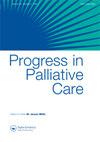Candidates and candidacy: Patient, carer and staff perceptions of referral to a specialist palliative day unit
IF 0.8
Q4 PUBLIC, ENVIRONMENTAL & OCCUPATIONAL HEALTH
引用次数: 0
Abstract
Background Specialist palliative day care can support palliative caregiving for those living in the community with advanced disease. However, how people access specialist palliative day care and why is unclear. This study therefore aims to explore the referral experiences of patients, carers and staff in the context of a specialist palliative day care unit. Design Qualitative study using constant comparative analysis to explore referral experiences to a UK specialist palliative day unit through one-to-one interviews with patients (n=15), family carers (n=6) and staff (n=10) including nurses, medics and managers and focus groups with (n=3 and n=7) specialist palliative care nurses. Findings The three datasets (staff, patients and carers) provide a triangulation of perspectives captured within the core category of ‘managing referral’ and presented as six sub-themes. Staff described referral as an intuitive interaction involving ‘looking for openings’ and ‘getting people through the door’. Patients familiar with the service were persistent in ‘shouting for help’ but most regarded referral with dread, only ‘giving it a go’ following crisis. For family carers referral presented ‘time out/respite’ but also the ‘end-of-the-line’. Conclusions Unclear understandings of services as well as uncertain professional, patient and carers notions of candidacy influence referral to specialist palliative day care.候选人和候选人资格:患者、护理人员和工作人员对转诊到专业姑息治疗日间病房的看法
背景专业姑息日间护理可以支持社区中晚期疾病患者的姑息护理。然而,人们是如何获得专业姑息性日托的,以及为什么还不清楚。因此,本研究旨在探索患者、护理人员和工作人员在专科姑息日托室的转诊体验。设计使用持续比较分析的定性研究,通过对患者(n=15)、家庭护理人员(n=6)和工作人员(n=10)(包括护士、医务人员和管理人员)的一对一访谈,以及与(n=3和n=7)专业姑息治疗护士的焦点小组,探讨转诊到英国专业姑息治疗日间病房的经历。调查结果这三个数据集(工作人员、患者和护理人员)提供了“管理转诊”核心类别中捕获的视角的三角测量,并作为六个子主题呈现。工作人员将推荐描述为一种直观的互动,包括“寻找机会”和“让人们进门”。熟悉这项服务的患者坚持“大声呼救”,但大多数人对转诊感到恐惧,只是在危机发生后才“尝试一下”。对于家庭护理人员来说,转诊提供了“暂停/喘息”,但也提供了“终点线”。结论对服务的不清楚理解以及不确定的专业人员、患者和护理人员的候选观念影响了转诊到专业姑息日间护理。
本文章由计算机程序翻译,如有差异,请以英文原文为准。
求助全文
约1分钟内获得全文
求助全文
来源期刊

PROGRESS IN PALLIATIVE CARE
PUBLIC, ENVIRONMENTAL & OCCUPATIONAL HEALTH-
CiteScore
2.60
自引率
11.80%
发文量
24
期刊介绍:
Progress in Palliative Care is a peer reviewed, multidisciplinary journal with an international perspective. It provides a central point of reference for all members of the palliative care community: medical consultants, nurses, hospital support teams, home care teams, hospice directors and administrators, pain centre staff, social workers, chaplains, counsellors, information staff, paramedical staff and self-help groups. The emphasis of the journal is on the rapid exchange of information amongst those working in palliative care. Progress in Palliative Care embraces all aspects of the management of the problems of end-stage disease.
 求助内容:
求助内容: 应助结果提醒方式:
应助结果提醒方式:


